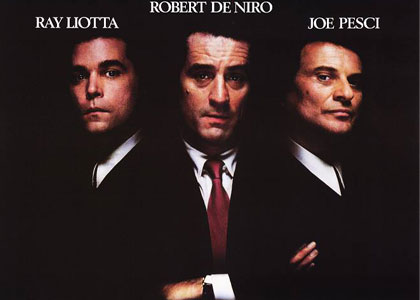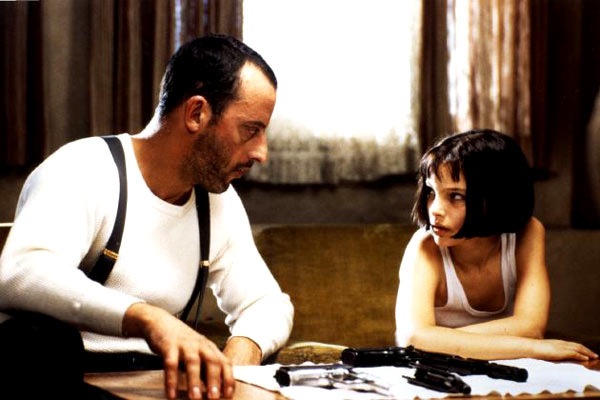Over the past few weeks Barb and I have watched a couple of movies which raise a curious question for me. Why do we (speaking generally) find watching evil portrayed before us so entertaining?
The two movies are very highly rated crime dramas, Goodfellas and The Professional.
 Goodfellas is the story of a man who as a young boy finds his sense of community and purpose in the mob. This is his story, and it is a sad story, and it is a story told with much violence and disregard for human life. But given that one of the purposes of a film is to entertain, why do we find such a film entertaining?
Goodfellas is the story of a man who as a young boy finds his sense of community and purpose in the mob. This is his story, and it is a sad story, and it is a story told with much violence and disregard for human life. But given that one of the purposes of a film is to entertain, why do we find such a film entertaining?
Whereas Goodfellas is a far more ‘mainstream’ and predictable mob movie, Leon: The Professional is not. It is an offbeat and odd story about a sensitive, emotionally stunted hit man played perfectly by Jean Reno. His predictable life is turned on its head when he takes in a emotionally starved, recently orphaned (her whole family murdered) girl played with freaky skill by an 11-year old Natalie Portman.
 This may sound like I’m recommending the movie. I’m not. Parts of it are very, very disconcerting as our hit man agrees to train his orphan in his trade, and the orphan begins to see the hit man as more than a big brother. This was a far more original and engaging story. But the same question comes to mind: why do we find watching evil entertaining?
This may sound like I’m recommending the movie. I’m not. Parts of it are very, very disconcerting as our hit man agrees to train his orphan in his trade, and the orphan begins to see the hit man as more than a big brother. This was a far more original and engaging story. But the same question comes to mind: why do we find watching evil entertaining?
In both cases, and in many like it, the ‘heroes’ are not the traditional ‘good guys’, but rather men who make their living destroying the lives of others. These men are conflicted – they struggle with the nature of their living, but their lives are evil. And we will spend two hours watching.
My question is not whether we should be watching these films. That would be a worthy conversation, no doubt. My question is why do so many (apparently) find such films entertaining?
UPDATE: I am reading about Old Testament narrative in preparation for an upcoming sermon series, and found this quote somehow applicable to the above question:
“A story invites the reader to surrender his or her own thought system and to enter the world of another and to be carried along by the flow of this other world. Through this the reader becomes an insider, a part of the world of the narrative….
“We can see parallels in modern cinema, which entices the audience to identify with a different world and a different worldview in an entertaining and subtle way. Moviemakers are thoroughly aware of a story’s power to draw the audience in to adopt an alien perspective and value system.” (Bruce K. Waltke, An Old Testament Theology, pages 104-105)

Gus/Adri
Venturing a guess, which was thought out before your footnote was added. 1) there is the element of liking to be scared: could I become a person like this, doing such awful things?2) an element of pride: I am better than that; I could/would never become such a person i.e. do such evil.FWIW–ae
MagistraCarminum
In addition to what Adri said (which had also come to my mind), I wonder if we don’t in some way vicariously enjoy the sin of others, knowing we do not have to commit it ourselves to enjoy its pleasures. This, I think, is the most dangerous reason we watch the sins of others, like voyeurs, experiencing from afar.
Gail and Keith
I do not enjoy watching films portraying evil. It speaks of “man’s inhumanity to man” and scares me, I suppose, because these atrocities could easily be perpetrated on me. Interesting side note on the phrase I quoted:http://www.phrases.org.uk/meanings/244100.htmlThis phrase, which is always used with a sense of regret, was coined by Robert Burns and used in his poem From Man was made to Mourn: A Dirge, 1785: ‘Many and sharp the num’rous ills Inwoven with our frame! More pointed still we make ourselves Regret, remorse, and shame! And Man, whose heav’n-erected face The smiles of love adorn, – Man’s inhumanity to man Makes countless thousands mourn!Gail
Randy Greenwald
I am sitting at Panera, overhearing (NOT eavesdropping) a conversation between an EMS guy with an obvious law enforcement background talking with another whom I can’t identify. The ex-cop is describing the difference between the impact of pepper spray and a taser in subduing a bad guy. The reality this brings reminds me that these things are real. The mafia is real. Crime is real. Violence is real. People without concern for life are real. Evil is real. Sin is real. I don’t enjoy being reminded of it, but there is value in being reminded. Story – in this case movies – does draw me into a world that I would not normally frequent or observe. I don’t want to stay there, and I don’t wish to participate in a story that legitimizes or glamorizes that evil. But there is yet some value in being brought into it, safely, even for a time.
MagistraCarminum
I think this is true, Randy. But your questions was “Why do we enjoy watching evil”. There is a tough line for me to draw between enjoying evil as entertainment and seeing evil as a reminder of its potence and power in this broken world. I have no problem with being reminded. But I think I should have a problem with watching evil for entertainment. The problem is that line is so blurry for me. I think this is likely because I love evil too much, and don’t hate it enough.
Randy Greenwald
I’ve been reading Flannery O’Conner, and she presents to us quite an array of twisted characters. “A Good Man Is Hard to Find” is a great story which ends with an awful display of violence, but the man who commits that violence is presented as a human character for whom we feel at least a bit of sympathy.Perhaps we enjoy what is human in these stories and should not condemn ourselves for that.
MagistraCarminum
I must admit that while I enjoy O’Connor to some degree, and understand her use of imagery and violence, it is not my cup of tea. And you are right in pointing out that we feel sympathy for the humanity of men in their tragic state. However, many things that one could argue avoid glorifying evil, give a more voyeuristic look at it than I am comfortable with. There are some things, after all, that should not even be named among us. Part of the question I struggle with is when I have crossed that line over into giving myself ideas I should be trying to avoid having. I don’t know if you understand what I’m saying. Speaking for myself, I can often find ways to justify watching evil that I probably shouldn’t, and give all kinds of great sounding arguments, just because on some level I want to. That is not a good reason to watch evil.
Randy Greenwald
Chris,Agreed – our hearts are deceitful and may find pleasure where they ought now. But, our hearts are also fearful, and may place limits where they need not. Oh, for wisdom.
MagistraCarminum
Amen, Randy. Perhaps the real question is, how do we watch film, or read books, or do anything for that matter, with an eye to the protection and growth of our own holiness through the process of becoming more Christ-like? I need to ask that question more often when I watch movies.
Randy Greenwald
I’m waiting for someone with film studies coursework under his belt to chime into this one, but thus far, Snowbot has remained strangely silent. ARe you there…?
Matthew
Speaking of being OC sprayed.. I get to enjoy that little experience AGAIN tomorrow. I have seen and enjoyed both films. Why do violent sports, or video games appeal to so many? I think it runs along the same lines.